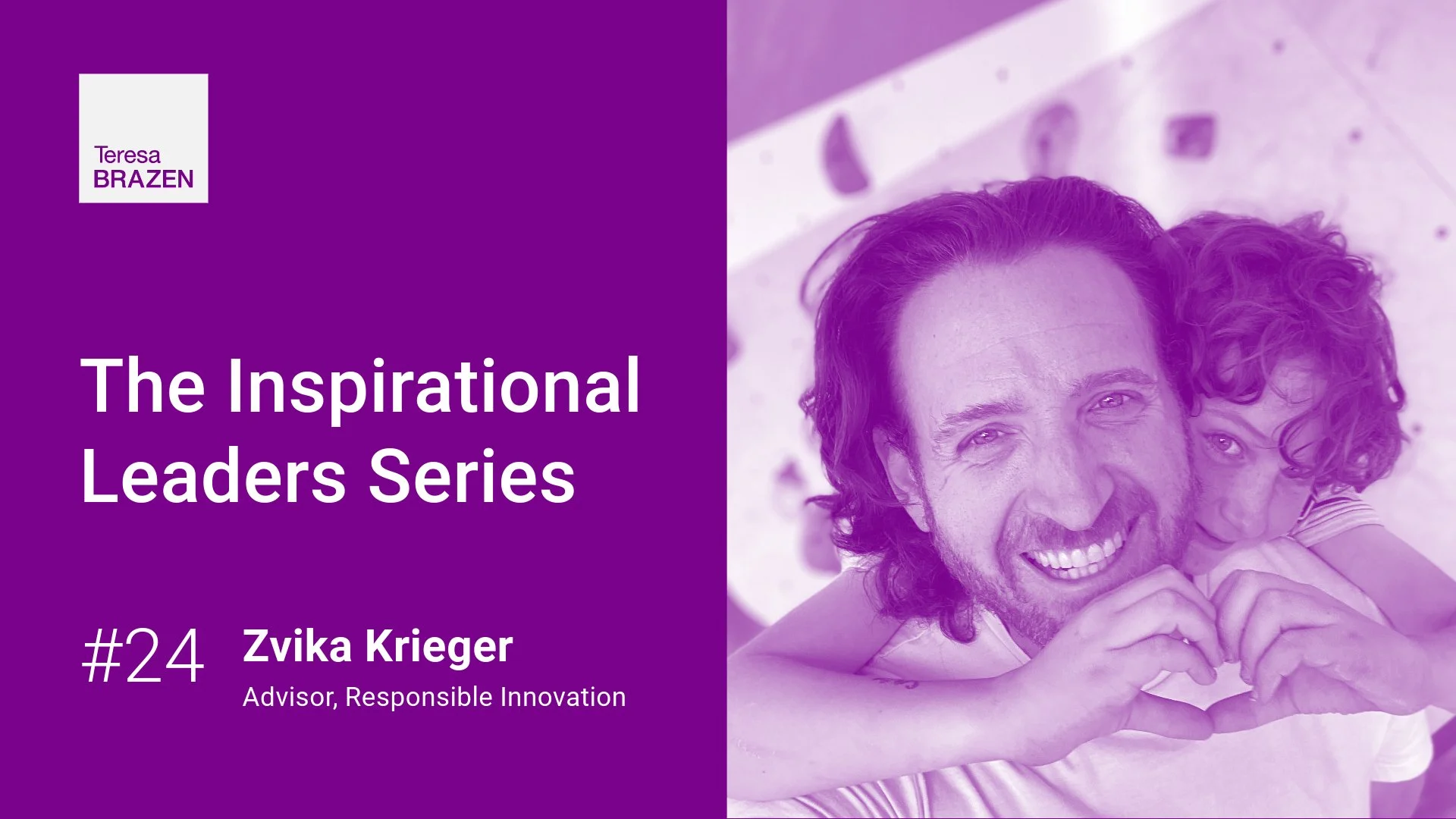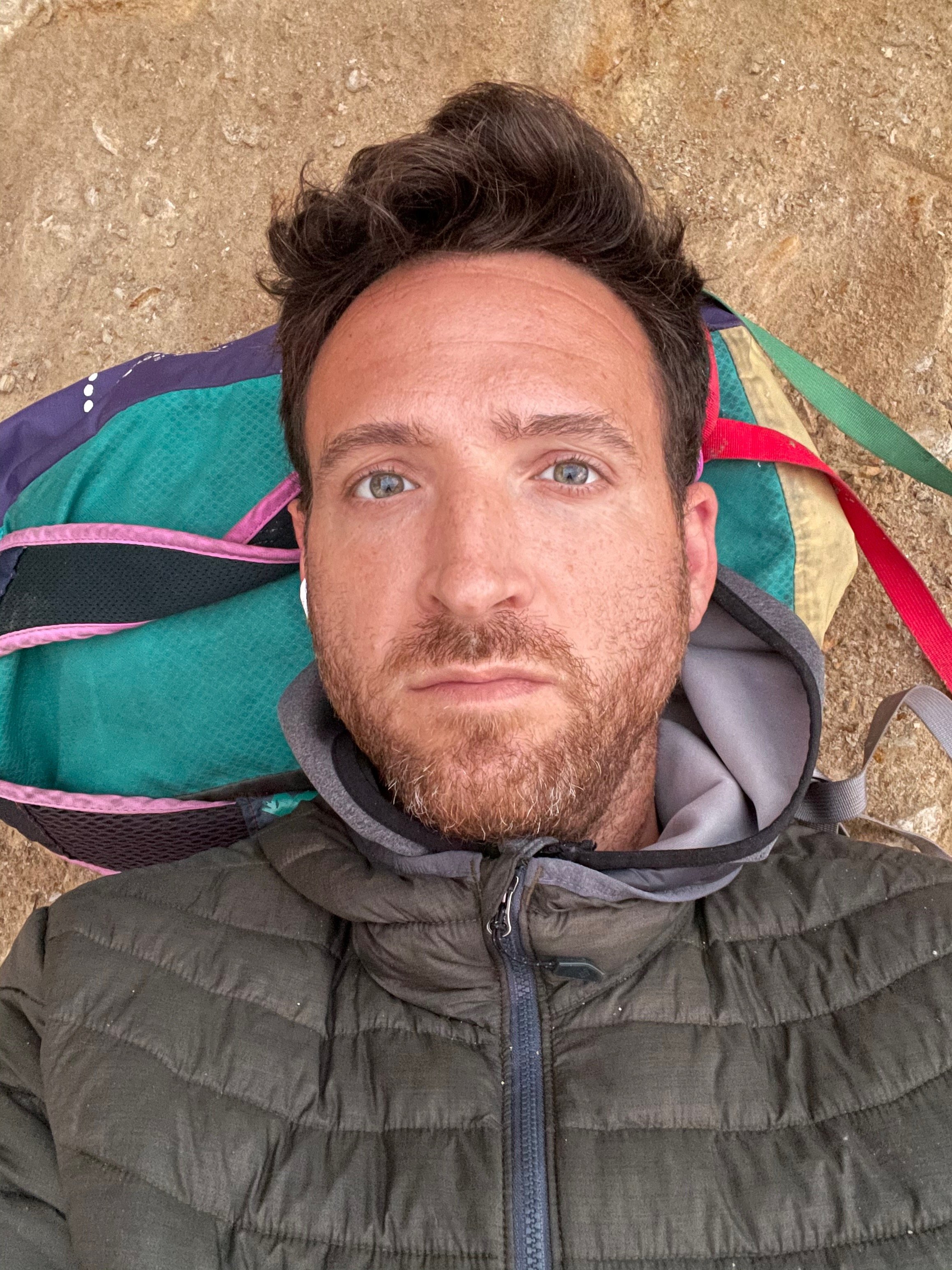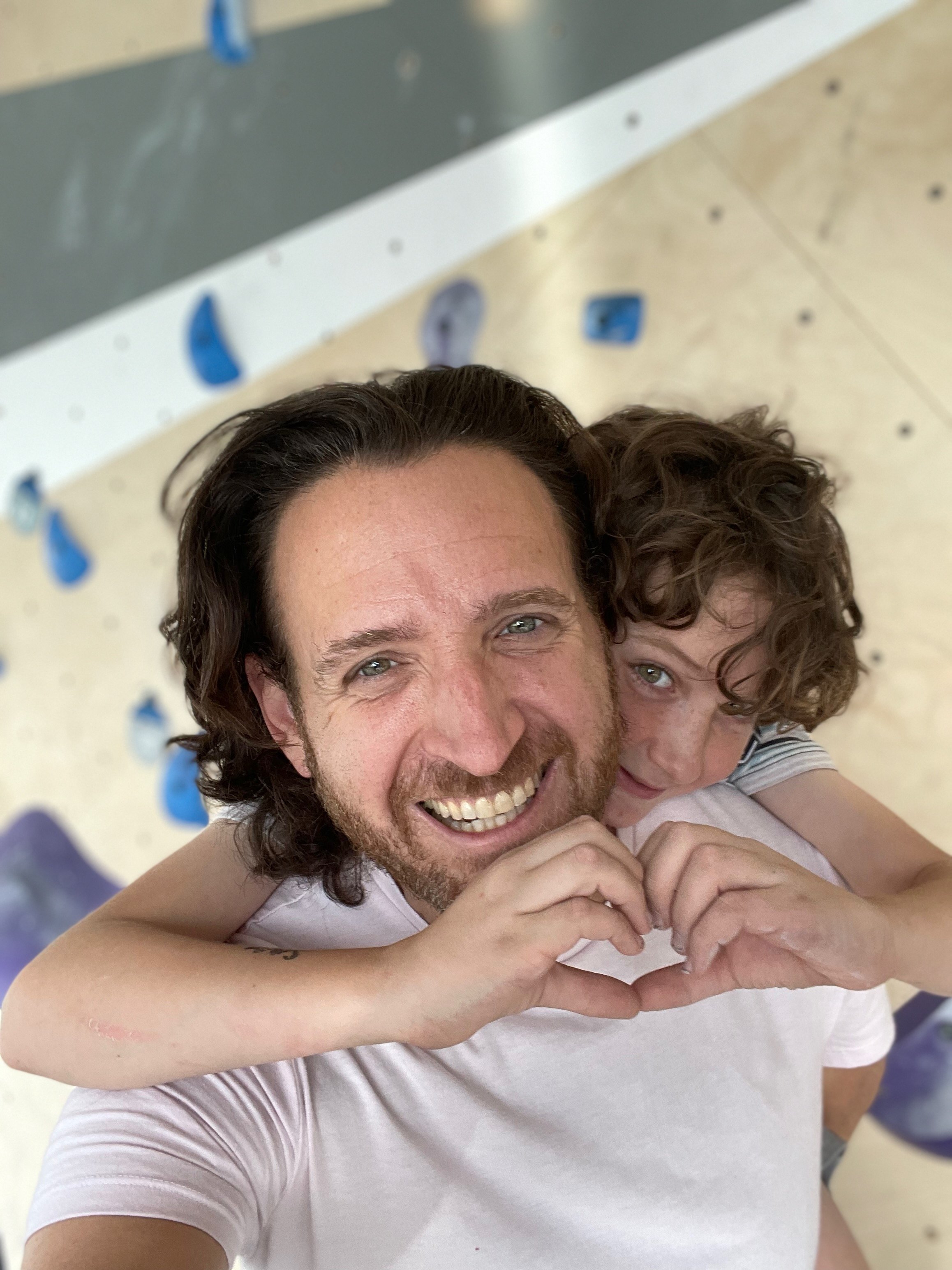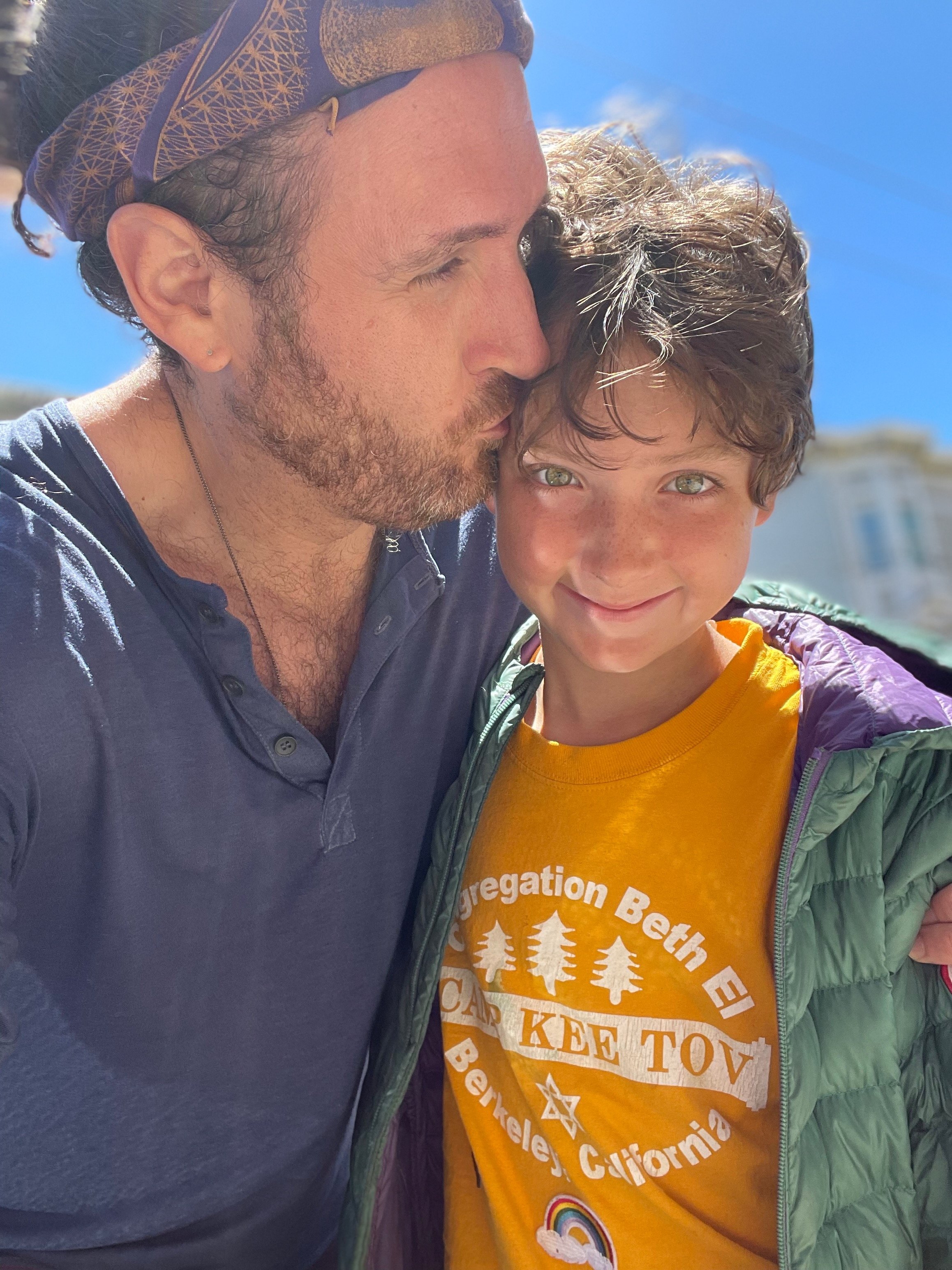“If a company wants to shift to responsible innovation, it doesn't happen at the executive level; it happens down in the trenches, in everyday decisions by product designers, engineers, product managers, data scientists that impact users. So, you really need to think about how your both hard incentives and soft incentives support those kinds of behaviors that lead to responsible outcomes” - Zvika Krieger
Welcome to the Inspirational Leaders Series, a collection of short interviews with sharp, impactful leaders that I know and respect—because the business world needs more refreshing people like them.
Meet Zvika Krieger. He has a very interesting resume. Zvika was Meta’s first-ever Director of Responsible Innovation; Executive Committee Member of the World Economic Forum; the U.S. Department of State's first-ever representative to Silicon Valley; Senior Strategist at the Office of the Secretary of Defense, where he worked on climate change, Middle East strategy, policy, innovation, and emerging technology. Before that, he spent a decade as a journalist. Today, Zvika is advising companies on responsible innovation strategies to anticipate and mitigate potential harm due to their products and serving as the spiritual leader of a Jewish spiritual center in Berkeley called Chochmat HaLev.
(Note: This interview has been lightly edited for length and clarity.)
What is a leadership belief you’ve changed your mind about?
I'm a huge advocate for design thinking or human-centered design. I've taught at Stanford, Berkeley, and Rhode Island School of Design. I brought design thinking to the U.S. military and the U.S. State Department. It's my go-to way of tackling challenges. And so in almost every leadership position I've had, I've baked that into the DNA of the teams I've led, something like “bias towards action,” or “when in doubt, try it out,” and we're gonna prototype, test, and iterate.
But someone on my team made me think twice about the religion of design thinking: a woman of color in tech. We were a new team trying to do something new within a larger organization. I said, “Rather than spending months trying to develop complex blueprints, let's get out into the company and just start working with the teams and customers, and see what we can learn.”
Learning is the gospel of design thinking, and everyone on my team gravitated towards that except this woman. She was spending all of her time writing very detailed playbooks and resisted getting out into the world until she had everything perfectly mapped out. I had to have a come-to-Jesus talk with her: “You haven't done any experiments with our customers; you haven't done this design thinking approach.”
She said, “Your approach is rooted in white male privilege. You keep saying, ‘fail fast, fail smart.’ In my career, like, if I fail as a woman of color, I don't get a second chance; either I'm fired or I am not promoted. I need to be very clear about the plan, expectations, and metrics, because if I don't do that, I'm told not hitting the mark.”
Failure is going to be embraced as a learning opportunity for straight, cis, white guys in Silicon Valley. Those are the people who championed design thinking. That was a paradigm-shifting moment for me. There's a level of privilege inherent in that mindset
How did that impact your approach moving forward?
I look back on my biggest successes in my professional life, and they came from that mindset. And I was like, I don't know another way to operate. I took a two-pronged approach: making space on the team for other kinds of approaches and recognizing that design thinking is not the only way to get things done. Taking a more expansive view of working styles, creating more psychological safety for people on my team, emphasizing to them that if you do fail, you're not going to get penalized.
Are there any other challenges that have turned you into a better leader?
Realizing that not everybody wants to be managed in the way that I want to be managed, and not making assumptions that the way I operate is the way that other people operate. People have different personality types, different working styles, and I, as a leader, need to meet people where they're at.
I really love being an optimist, but I started getting back-channel feedback from people on my team (like anonymous input from my performance evaluations) that I was tone deaf. They were like, “Doesn't he realize we're in a moment of crisis? Doesn't he see any of the dysfunction? He's constantly trying to paint everything in a rosy picture.” I realized, even if I do bring a dose of optimism — “here's how we're going to solve it” — to at least name what's not working is important.
Another example is complementing strengths. I've tried to deepen my own skills in prioritization and strategy, but also to build teams who have those strengths to serve as a counterbalance. It's so easy to attract people like ourselves, but for creativity and innovation, you need diversity of thinking and ways of looking at things and things and operating.
An important part of your role was inspiring people towards something that may not have been, an innate motivation in the organization, like ethics and responsible innovation. What have you learned about inspiring people toward that mission or vision?
There are a few different ways to think about responsible innovation. One is, when working in a for-profit company, to tie those efforts to the bottom line: what do customers want? This isn't just about ESG [Environmental, Social, and Governance] or social impact. That'll get you to a certain place within the company. You need to frame things that this is what customers want, or government regulation is moving in this direction, and we need to get out ahead of it. Or, if we don't demonstrate leadership, we're gonna get regulated in a way that doesn't serve us.
Companies care about employee satisfaction, especially now we're in a war for talent. Millennials are starting to get into more senior ranks of the workforce, and feeling that we're having a positive impact in the world is a big reason why people choose certain jobs and then choose to stay. There's a lot of research behind that.
At Meta, there's a survey that goes out to the entire employee base. [Feeling] like the product is doing good in the world or that the company is prioritizing the wellbeing of its users was very much correlated with employee satisfaction. That became a selling point for executives to invest in this, not to mention that customers are demanding that their products be more responsible.
You do have to think about incentives. What are you rewarding your employees for (hard incentives — what gets them promoted, bonuses, and good performance evaluations) but also what is celebrated in the company (who gets showcased during all-hands meetings or investor calls are soft signals to what is valued). If a company wants to shift to responsible innovation, it doesn't happen at the executive level; it more so happens down in the trenches. It happens in everyday decisions by product designers, engineers, product managers, data scientists…decisions they're making that people in the C-suite have no idea about that impact users. So, you really need to think about how your both hard incentives and soft incentives support those kinds of behaviors that lead to responsible outcomes
I imagine there's some aspect of leadership that goes across your work on responsible innovation, as a spiritual leader, and being a dad, What is a quality of leadership that moves you?
People look at my career trajectory, and they're like, what is the through line? I say the common thread between everything I do is what I think is going to have the biggest impact on society and the issues I really care about — that's my driving force.
In addition to optimizing for social impact, what I really optimize for is learning. I want every job to be as different as possible so that I can learn as much as possible. I do think in the world that we're living in right now, where the challenges are so complex and interconnected on a systems level, having different perspectives actually makes you into a better leader. Having worked in government, private sector, civil society, academia, NGOs…we need all of those different sectors to tackle those problems.
When I was going to switch to working in government, I went to a mentor of mine (the literary editor of a prestigious journal). He said, “You can do whatever you want, but you don't want people to look at your resume and think you're a dilettante.” This was 20 years ago, and I've taken the opposite of that advice. This person was from a generation where you pick one field, and you just do that for your whole career. The world we're living in right now is not conducive to that. I hire people who have a diversity of experiences; and it's been nourishing for me and good for my career and my leadership to optimize for that, as well.
I love the way that you frame that I split my job between three things, and one of them is being a dad. One of the reasons I stepped out of full-time corporate work was to be able to spend more time with my son. It's important for leaders to be modeling those kinds of boundaries. Whenever I was leaving work early to go pick my son up from school, I was always clear to tell people this is why I'm leaving. People are burning out right and left, and at the end of the day, you don't want to look back on your life and say, “I wish I spent more time with my family or invested in the things that were really important to me.”
I would love to see more men model that publicly in the work environment, to make it safer for other men and women to do that.
I run a spiritual center here in Berkeley, and I've had a deep spiritual practice for my whole life. Since I was a kid, I was Sabbath observant, which meant that I didn't check my phone or email for 24 hours, once a week. I think that having that practice made it easier for me.




